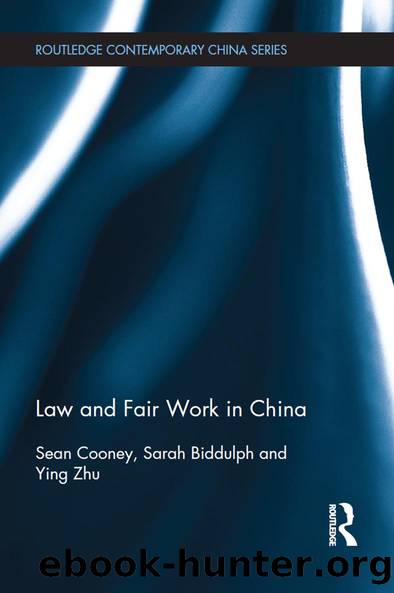Law and Fair Work in China by Sean Cooney Sarah Biddulph Ying Zhu

Author:Sean Cooney, Sarah Biddulph, Ying Zhu [Sean Cooney, Sarah Biddulph, Ying Zhu]
Language: eng
Format: epub
Tags: Social Science, Ethnic Studies, General
ISBN: 9780415674072
Google: 65xanNEYPk8C
Publisher: Routledge
Published: 2013-01-15T05:46:19+00:00
The scope of the Labour Contract Law
While clearly not a definitive answer to the gaps and enforcement problems left over from the Labour Law, the Labour Contract Law clearly improves the regulatory framework for work in China and, by means of its formalization measures, seeks to ensure that the terms and conditions of millions of individual workers are readily identifiable and accessible, not only for the parties to labour relationships but also for enforcement agencies.
Nonetheless, the Law reproduces the conceptual frame set out in the Labour Law. Like that Law, it avoids the Chinese terminology of âemploymentâ (although these terms are universally deployed in English translations), continuing instead to refer to âwork unitsâ (ç¨äººåä½) and âpersons engaged in labourâ (å³å¨è ). As we discussed in Chapter 4, this means that persons such as agricultural workers, students, home workers and independent contractors continue to be excluded.9 One exclusion is, however, addressed. This concerns the position where a work unit is not validly registered and thus is unlawful. As we have seen, where workers are engaged by individuals, the standards in the Labour Law and the provision of the Labour Contract Law cannot apply, since individuals are not âwork unitsâ.
One obvious solution to this problem is to enable a labour contract to be concluded with an individual; the Labour Contract Law eschews this, presumably because it would radically alter the conceptual framework underlying Chinese Labour Law. It adopts instead a second best, but ingenious, solution, which first appeared in the provincial wage regulations developed during the Wages Campaign discussed in Chapter 5. That is, if a worker has performed services for an unlawful entity, the entity or the individuals who have contributed capital to it must pay outstanding remuneration and economic compensation to the worker for loss caused (article 93).
Download
This site does not store any files on its server. We only index and link to content provided by other sites. Please contact the content providers to delete copyright contents if any and email us, we'll remove relevant links or contents immediately.
Spell It Out by David Crystal(36117)
Life for Me Ain't Been No Crystal Stair by Susan Sheehan(35811)
Cecilia; Or, Memoirs of an Heiress — Volume 1 by Fanny Burney(32558)
The Great Music City by Andrea Baker(32019)
Cecilia; Or, Memoirs of an Heiress — Volume 2 by Fanny Burney(31956)
Cecilia; Or, Memoirs of an Heiress — Volume 3 by Fanny Burney(31942)
Professional Troublemaker by Luvvie Ajayi Jones(29663)
The Secret History by Donna Tartt(19092)
We're Going to Need More Wine by Gabrielle Union(19046)
Twilight of the Idols With the Antichrist and Ecce Homo by Friedrich Nietzsche(18634)
All the Missing Girls by Megan Miranda(16029)
Cat's cradle by Kurt Vonnegut(15357)
Pimp by Iceberg Slim(14508)
For the Love of Europe by Rick Steves(14121)
Bombshells: Glamour Girls of a Lifetime by Sullivan Steve(14076)
Talking to Strangers by Malcolm Gladwell(13370)
Norse Mythology by Gaiman Neil(13366)
Fifty Shades Freed by E L James(13242)
The Social Justice Warrior Handbook by Lisa De Pasquale(12190)
